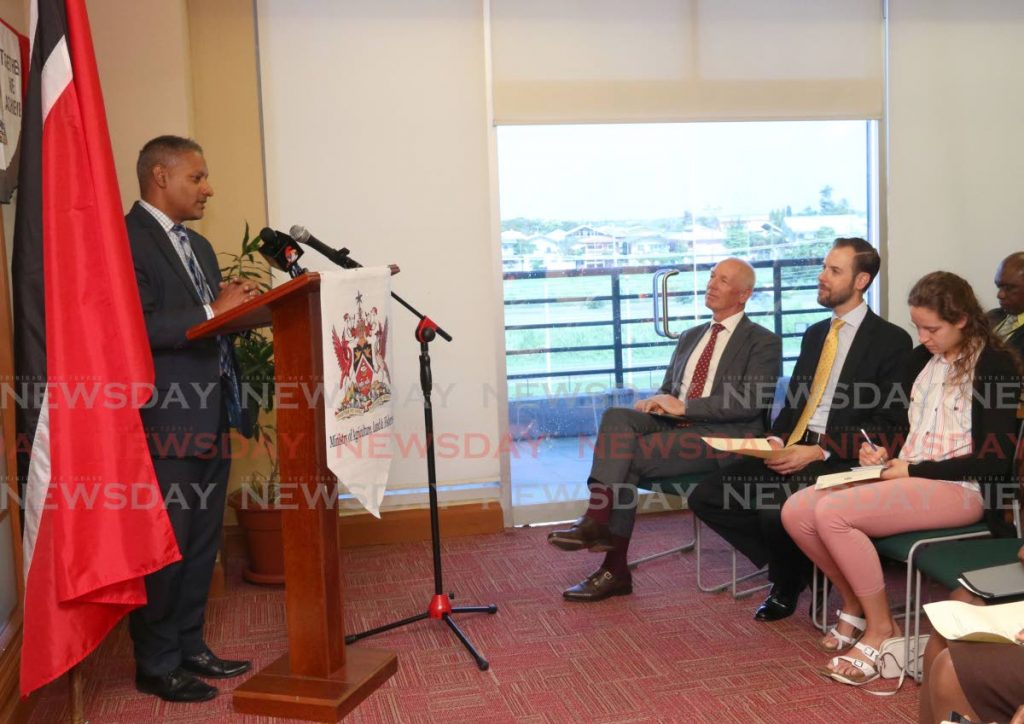Rambharat: Borders not porous but completely open

IN a ceremony at his office in Charlieville, Chaguanas on Tuesday, Agriculture Minister Clarence Rambharat signed a memorandum of understanding (MoU) with five other ministries for collaboration in regulating fishing and fishing-related activities and relevant trade.
Rambharat said legislation will be put in place for safety on the seas which will include having a tracking device on a vessel to pinpoint where it is, particularly in an emergency.
This was necessary, he said, “As an island with open borders – and people use the term ‘porous borders’: the borders are not porous, the borders are completely open.”
Fisheries, he said, are a complex topic.
“Once someone has a boat with an engine, one can go out fish – but one also has the opportunity to be involved in criminal activities. We know about the official fishing ports and points; we also know about the unofficial fishing points that being used by criminals. Fisheries facilities are being used by criminals, as there are numerous reports about it and it is vital that legislation is in place.”
Among those signing this agreement were Permanent Secretary (PS) in the Agriculture Ministry Lydia Jacob; chief administrator in the Tobago House of Assembly Bernadette Solomon Koroma; National Security PS Vel Lewis, Ministry of Works PS Sonia Francis; and Ministry of Trade and Industry PS Christopher Rajh.
Rambharat said the need for collaboration among agencies, particularly those for making legislation, is obvious.
"In a sense, we are forced to do an agreement and enter into an arrangement and commit to collaborate in something that should be obvious," he said.
The European Union (EU), he said issued a "yellow card" to TT in 2015 for fishing and fishing-related activities and relevant trade. Rambharat said he was happy for the yellow card in a sense because it forced the ministries to do certain things that needed to be done.
Fishery legislation, he said, is now 106 years and consists of nine clauses, and the biggest challenge in operating and managing the fisheries sector is the inability to enforce it.
“One can enforce based on policy agreement or legislation. If we do not have these instruments to work with, then what you are looking for is voluntary support.”
Fisheries are complex, he said because it is not as simple as going out and catching fish, it is about operating in waters in bilateral and multilateral agreements that support the activity.
The MoU was produced by a Cabinet-appointed inter-agency committee tasked with finalising and initiating an action plan to address illegal, unreported and unregulated (IUU) fishing in the ports and waters under TT jurisdiction of TT.
The impetus for the committee and the MoU was to put in place arrangements to reverse the "yellow-card" status assigned to TT as a consequence of its being pre-identified as a non-co-operating state in the global fight against IUU fishing, and to avert "red card" status, which could have significant impacts on the international image and reputation of the country, as well as socio-economic impacts on trade and port operations.
Operators involved in IUU fishing reportedly also frequently engage in other maritime crimes including people-smuggling and trafficking and illicit trade in items such as weapons, drugs, fuel, and wildlife. Therefore IUU fishing is also a national security and social issue. IUU fishing is lucrative, with operators globally earning an estimated US$10-$23 billion annually. The result is losses incurred by states in foregone revenue and opportunity for community-based development. In addition, fish stock assessment, and by extension fisheries management, is compromised owing to limited data on fish harvested from IUU fishing operations.
Jacob said the main purpose of this MoU is to strengthen and formalise long-term, routine inter-agency collaboration among government agencies.
“Increasingly IUU fishing, along with seafood fraud and sanitary and phyto-sanitary standards, have implications for the trade in fish and fish products. In 2016 fish and fish products accounted for 79 per cent, which is TT$52.4 million, of the total exports of vegetable and animal products to the United States, the main export market for fish and fish products,” she said. Addressing IUU fishing is therefore a key factor in retaining existing export markets she said and attracting new markets.
IUU fishing also undermines sustainable fisheries management and is a serious threat for marine ecosystems, leads to the loss of short- and long-term social and economic opportunities and has negative impacts on the livelihoods of legitimate fisherfolk and coastal communities around the globe, particularly in developing countries.


Comments
"Rambharat: Borders not porous but completely open"